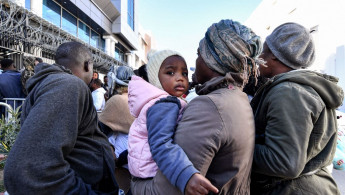Tunisian experts voice fears for economy after Saied’s 'racist' comments on African migrants
Tunisian experts have voiced fears over their country’s economic situation following racially charged comments by President Kais Saied regarding migrants from African countries south of the Sahara.
Last week, Saied said that "hordes" of African migrants were arriving in Tunisia, adding that there was a conspiracy to change the demographic make-up of the country.
He blamed the migrants for "violence, crime and unacceptable practices" and ordered a crackdown on irregular migrants.
Saied’s comments, which were condemned by the African Union and human rights groups, have spread worry among sub-Saharan Africans in Tunisia as well as black Tunisians, raising fears of racial tension and violence as the country continues to reel from a prolonged economic crisis.
The crackdown by security forces on African migrants is ongoing.
Anti-Black racism in Tunisia 🇹🇳 is rising. President Kais Saied is using hateful rhetoric against Black Africans and framing Tunisia as a “non-African nation.” pic.twitter.com/S9saTOd0a4
— Khaled Beydoun (@KhaledBeydoun) February 28, 2023
Mohammed Damaq, the head of Tunisia’s National Space for Private Universities told The New Arab’s sister site Al-Araby Al-Jadeed that African students make up 15 percent of the student body in Tunisian private universities, with each student contributing around 8,000 euros per year to the Tunisian economy.
He said there were "real fears" that the racist narrative being promoted in Tunisia would affect Tunisian universities, adding that there was "ferocious competition" from Morocco to attract students from south of the Sahara.
Last Thursday, the Tunisian African Business Council voiced its "deep concern" over the government’s campaign against African migrants and called for the preservation of "human, economic, and financial relations with African partners".
In a statement, it said that "authorities must send a strong message to police forces regarding their role in preserving people’s security and safety, including foreigners".
In 2018. Tunisia joined the Common Market for Eastern and Southern Africa (COMESA), a regional free trading bloc.
However, experts say that Tunisia has not fully exploited the potential of this market, amid a lack of financial and transport links.
Nafi Nafer, a member of the Tunisian Union of Industry, Trade and Handicrafts (UTICA), said that the incitement of racist hostility against African migrants will have effects in the medium and long term on the Tunisian presence in the COMESA market.
He told Al-Araby Al-Jadeed that racist incitement will affect adversely affect Tunisia’s image in Africa and prevent it from gaining a presence in markets.
Last Saturday, Tunisian Foreign Minister Nabil Ammar met with African ambassadors to Tunis in an effort to calm the situation following Saied’s incendiary remarks.
He said that Tunisian authorities were "committed to protecting foreign residents whatever their nationality", but added that they would "stand up to irregular migration in the framework of Tunisian legislation and African and international treaties".





 Follow the Middle East's top stories in English at The New Arab on Google News
Follow the Middle East's top stories in English at The New Arab on Google News


